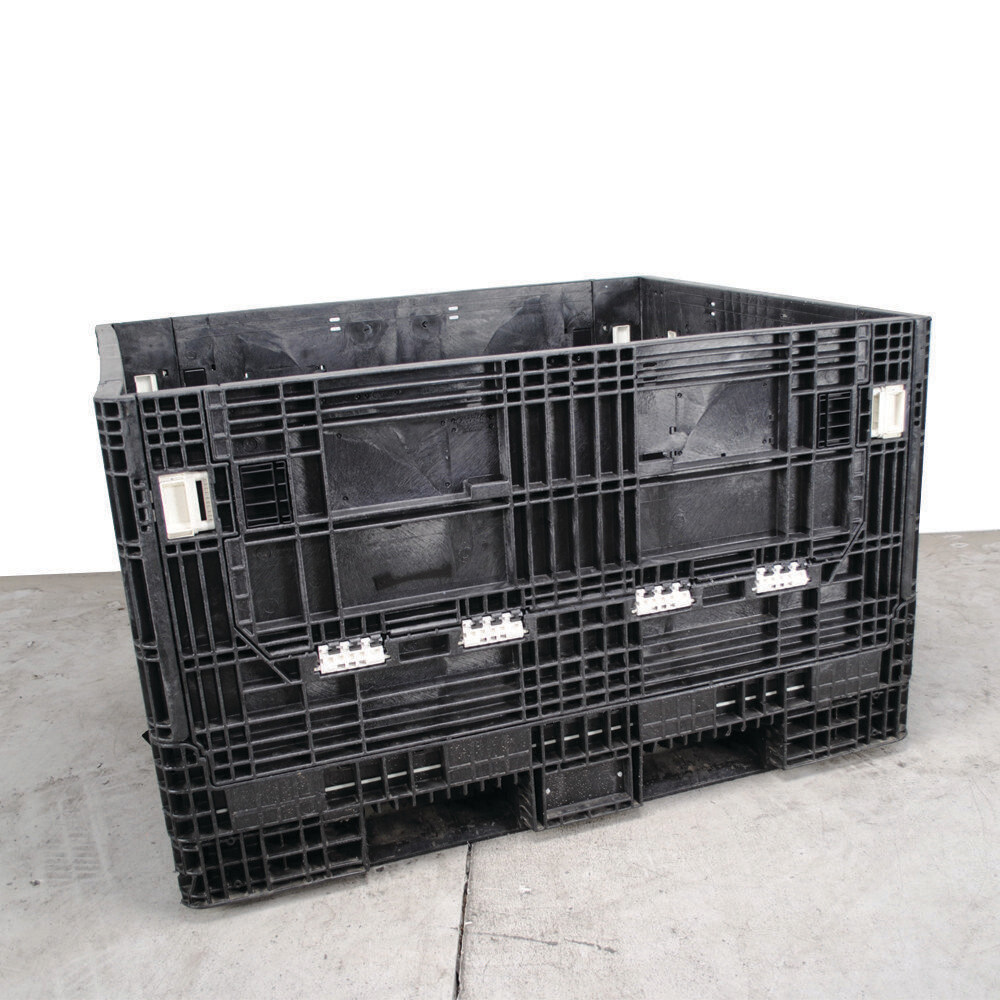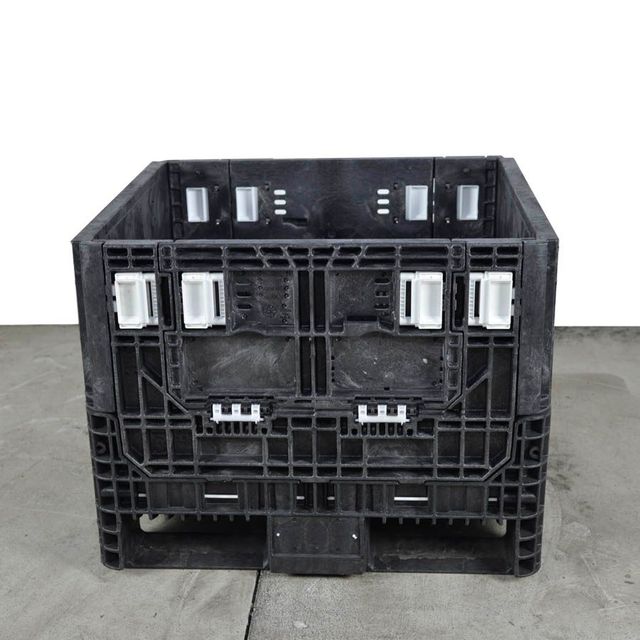The Ultimate Overview to Selecting the Right Bulk Containers for Your Organization Demands
Picking the proper bulk containers is critical for any kind of service that relies upon efficient logistics. Different kinds of containers exist, each made for details materials and applications. Elements such as size, product compatibility, and governing criteria play a substantial function in this decision-making procedure. Comprehending these components can bring about boosted functional effectiveness. Nevertheless, many services forget essential elements that could boost their total effectiveness and sustainability. What are these factors to consider?
Understanding Various Kinds Of Bulk Containers
Mass containers work as essential devices for companies looking for efficient storage space and transport options. These containers can be found in different kinds, each designed to meet particular functional requirements. One typical kind is the intermediate bulk container (IBC), which is excellent for granulated and fluid products, offering an equilibrium of capability and maneuverability. An additional popular choice is the bulk bag, or FIBC, appropriate for completely dry, flowable products. These versatile containers are light-weight and can be conveniently moved and stored. For much heavier products, rigid mass containers are usually utilized, providing durability and security for safe handling. In addition, there are specific containers customized for hazardous products, guaranteeing compliance with safety policies. Recognizing the distinct characteristics of these bulk container types allows organizations to make enlightened choices that optimize logistics and minimize expenses. By selecting the best container, companies can enhance their functional effectiveness and enhance their supply chain procedures.
Secret Material Considerations for Mass Containers
When choosing mass containers, it is necessary to consider the products made use of in their building. Elements such as toughness, chemical, and stamina compatibility play a vital role in ensuring the containers meet particular functional demands. Furthermore, weight and transportability worries can impact both performance and transportation logistics.
Material Sturdiness and Strength
Sturdiness and stamina are essential aspects in selecting products for bulk containers, as they directly affect the container's capability to withstand different ecological conditions and managing procedures. Products such as high-density polyethylene (HDPE), polypropylene, and stainless steel are frequently preferred for their robust residential properties, using resistance to impact, temperature level, and abrasion changes. The option of material additionally affects the general lifespan of the container; stronger materials commonly lead to much less frequent replacements, causing set you back financial savings over time. Furthermore, the weight of the material can impact delivery costs and simplicity of handling. Companies should consider their specific functional environments and the potential for wear and tear to assure peak toughness and strength in their bulk container choice.
Chemical Compatibility Variables
Understanding chemical compatibility is vital for choosing mass containers, as the products used should withstand the particular compounds they will certainly hold. Numerous variables affect compatibility, consisting of the chemical nature of the components, temperature level, and duration of storage. For example, destructive chemicals may require containers made from stainless steel or specialized plastics that resist destruction. Furthermore, responsive substances can generate warmth or gases, necessitating aired vent or pressure-rated containers. The selection of container material, whether polycarbonate, steel, or polyethylene, ought to line up with the chemical properties of the stored substances to avoid leakages or breaches. Eventually, a thorough evaluation of these compatibility factors guarantees safe handling and storage space, shielding both personnel and the setting while preserving item stability.
Weight and Mobility Problems
Selecting mass containers entails not just examining chemical compatibility yet additionally thinking about weight and transportability. Organizations must analyze the ease of handling and transport to enhance performance. Lightweight products like high-density polyethylene (HDPE) or aluminum can assist in easier activity and lower delivery expenses. On the other hand, much heavier containers may offer boosted resilience but can impede mobility, specifically in atmospheres calling for regular relocation. Additionally, the style of the container need to permit convenient training and piling, guaranteeing ergonomic safety and security for employees. Firms should likewise think about the infrastructure readily available for transport; as an example, containers compatible with forklifts or pallet jacks can enhance procedures. Inevitably, the right balance between weight and transportability directly affects operational efficiency and expense effectiveness.
Sizing Your Mass Containers for Ideal Effectiveness
When sizing bulk containers, organizations should carefully evaluate the measurements called for to fit their certain products. Furthermore, weight capacity is an essential variable that affects efficiency and safety and security check here throughout transportation and storage space. Efficient sizing not only optimizes area however likewise maximizes functional workflows.
Determining Container Capacities
Selecting the ideal dimensions for mass containers is vital for making the most of efficiency in storage and transport. Companies have to evaluate their certain demands, considering elements such as available room, the nature of the goods being saved, and the approaches of transportation used. Precise dimensions ensure that containers fit preferably in storage facilities and cars, reducing wasted area and reducing handling time. Criterion dimensions can provide ease, but personalized dimensions could be necessary for unique requirements or to accommodate certain products. Furthermore, it is necessary to review stacking abilities and ease of access, as these elements affect total operational efficiency. Ultimately, the ideal measurements result in boosted company and streamlined logistics, profiting the overall performance of the company.
Weight Capacity Considerations
Understanding weight capacity is important for organizations aiming to enhance their bulk container effectiveness. The weight capability of a container directly impacts storage capabilities, transportation logistics, and general operational costs. Selecting containers with the suitable weight limitations ensures that organizations can safely keep and carry their items without taking the chance of damage or compliance problems. Overloading containers can cause structural failures, while underutilizing capacity lead to lost resources. It is necessary for companies to analyze their item weights and take into consideration any type of regulatory demands when selecting containers. Additionally, factors such as the sort of material, planned usage, and environmental problems need to also affect weight capability decisions. By reviewing these elements, businesses can enhance effectiveness and guarantee a structured supply chain.
Governing Compliance and Safety And Security Requirements

Regulative conformity and safety and security criteria play a necessary function in the choice of mass containers for companies. Organizations should guarantee that their containers satisfy numerous laws set by regional, national, and worldwide authorities. These requirements often refer to product safety, structural stability, and appropriate labeling, which assist prevent mishaps and ensure the risk-free transportation of products.
Furthermore, adherence to industry-specific standards, such as those from the Fda (FDA) or the Occupational Safety and Wellness Administration (OSHA), is essential for firms handling dangerous materials or food. Non-compliance can cause penalties, legal issues, or damages to a company's online reputation.
Organizations need to likewise take into consideration the container's compatibility with the products being kept or moved to avoid contamination or chain reaction (used bulk containers). To sum up, understanding and implementing regulative compliance and security criteria is essential for the accountable and reliable use mass containers
Sustainability Alternatives for Eco-Friendly Mass Containers

Companies are additionally checking out choices made from recycled products, which not only conserve sources but additionally support the reusing industry. Moreover, innovations in style enable lighter containers that require less energy to transportation, additionally boosting sustainability. By incorporating these eco-friendly bulk container choices, companies can show their dedication to ecological stewardship while satisfying consumer demand for lasting practices. This change not only assists the earth however can additionally improve brand reputation and customer commitment.
Cost-Effectiveness and Budgeting for Bulk Containers
While numerous services concentrate on sustainability, cost-effectiveness remains an essential aspect when picking mass containers. Organizations should examine the first acquisition price, in addition to long-lasting operational expenses, to ensure economic stability. Factors such as upkeep, sturdiness, and reusability play a significant duty in figuring out overall expenses.
Purchasing premium containers may yield greater in advance expenses yet can result in savings with decreased replacement rates and reduced waste. Additionally, organizations ought to consider transport expenses and storage performance, as these can impact the overall spending plan.

Regularly Asked Questions
Exactly how Do I Identify the Right Container for Hazardous Products?
To figure out the ideal container for unsafe products, one must examine compatibility with the material, take into consideration the container's product, check for regulatory conformity, and assess ability and safety and security functions to assure appropriate handling and storage space.
Can Mass Containers Be Custom-made for Specific Products?
Yes, bulk containers can be customized for specific items. refurbished bulk containers. Different attributes, such as size, product, and design, can be customized to satisfy unique requirements, guaranteeing perfect safety and security and efficiency for moving and storing different goods
What Is the Typical Life Expectancy of Various Bulk Container Types?
The average lifespan of bulk container types differs; plastic containers last 5-10 years, metal containers 10-20 years, and wood containers commonly last 3-7 years, depending on usage, maintenance, and ecological problems.
Exactly how Should I Clean and Maintain Bulk Containers?
To clean up and maintain bulk containers, one should frequently evaluate for damage, eliminate residue, clean with proper detergents, rinse thoroughly, and guarantee proper drying out prior to storage space. Following supplier standards improves long life and security during use.
Exist Rental Options for Bulk Containers Available?
Yes, numerous firms offer rental options for bulk containers, providing flexibility for businesses. These leasings can accommodate numerous requirements, enabling firms to take care of stock effectively without the commitment of purchasing containers outright.
Sturdiness and stamina are vital factors in choosing materials for mass containers, as they directly influence the container's capability to endure different environmental problems and taking care of processes. Understanding chemical compatibility is important for selecting bulk containers, as the materials made use of need to withstand the specific materials they will hold. Recognizing weight ability is vital for companies intending to maximize their mass container performance. Governing conformity and security criteria play an important function in the selection of bulk containers for organizations. While many companies concentrate on sustainability, cost-effectiveness remains a vital aspect when selecting mass containers.